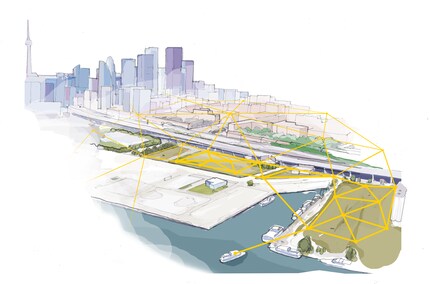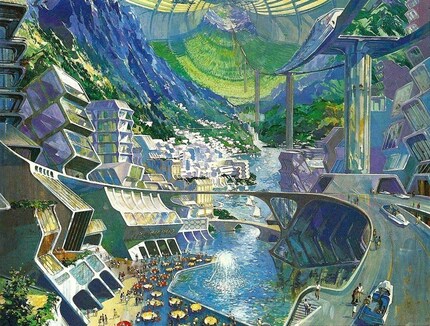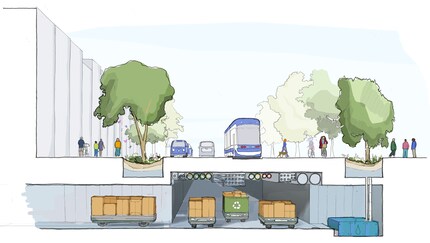
Google Sidewalk: Search engine builds city
Google is rebuilding a neighbourhood in Toronto. The company wants to build a city there that is ultra-modern and controlled by data management. Alarm bells are ringing for those concerned about privacy. A look at a controversial and probably forward-looking project.
"We are designing a neighbourhood in Toronto's Eastern Waterfront to address the challenges of urban growth. We are working in partnership with the Tri-Government Agency Waterfront Toronto and the local community," writes Project Sidewalk on its website.
.
Google is behind the innocuous-sounding Project Sidewalk. The search engine giant, which actually does everything because it has endless money and lots of ideas, is making further inroads into the real world and has big plans.
What is Project Sidewalk
Google - actually the parent company Alphabet Inc. - wants to upgrade a neighbourhood with Project Sidewalk. This neighbourhood is located in the Canadian city of Toronto. The search engine giant does not say exactly where, except for "Eastern Waterfront". As this neighbourhood does not yet exist, I have correlated the sketches with Google Maps. It seems that the Google city in the East Bayfront.

Google's vision for the neighbourhood is simply paraphrased.
Sidewalk Toronto will blend people-centred urban design with cutting-edge technology to achieve new standards of sustainability, affordability, mobility, and economic opportunity.
Translation:
Sidewalk Toronto combines people-centred urban design with cutting-edge technology to achieve new standards of sustainability, affordability, mobility, and economic opportunity.
This all sounds pretty good and, if applied to the city of Zurich, would solve pretty much every problem in the city. In detail, as far as can be seen on the Sidewalks website, it describes the following:
- No or only a few private cars
- Self-driving cars and digital navigation
- Connection to public transport timetables
- "More efficient homes and properties" that become affordable thanks to their efficiency
- New construction methods should enable mixed-use buildings and walkable neighbourhoods and reduce the cost of housing and retail space
- Lower energy consumption through innovations in infrastructure design
- Less waste, less carbon emissions
- All-weather infrastructure and its data-based management should make parks and public spaces more comfortable, busier and safer
- The self-driving cars should give back public space to pedestrians
- "Better data integration" and more accessible public infrastructure offering a variety of local services should provide holistic access to social and community services. This should deliver "better results" for less money
- A layer of digital infrastructure is at the heart of this future city, providing always-on connectivity for all, offering new insights into the urban environment and encouraging ingenuity and collaboration to solve local problems
Not the first smart city
The idea of a smart and networked city is not new. An entire genre of nostalgia, known as retrofuturism, is dedicated exclusively to archiving and marvelling at visions of the future from the past.
Several years before this video, film studio owner Walt Disney was looking at the future of cities. Disney had many grandchildren and wanted to make sure they had a nice place to live. The result, an unfinished design, is called Epcot. An acronym for Experimental Prototype Community of Tomorrow.

Epcot, based on a vision by Robert McCall, 1982
Disney wanted to bring elements of its beautiful, clean and happy theme parks to the crime-ridden and dirty cities of the world. Since both Disney World and cities take up a lot of space, Disney had people in the company who knew a thing or two about urban planning. Project Epcot was therefore intended to bring Disney idyll to the real world. Shortly before his death, Disney bought land in Florida. But Epcot was never built.
But in the idyllic Disney Worlds, Epcot is a reality. Every major park in the world has an Epcot Centre, where Disney's vision is allowed to live on.
- Barcelona has, among other things, installed a smart irrigation system in parks
- Dublin has an open data platform called Dublinked, where citizens and officials can interact openly
- Other cities are following suit in India, England, Spain, the Netherlands and other countries around the world
Despite all the initiatives, Google's Sidwalk project is the first city to be completely smart and already under construction.
The nightmare for privacy
This is all quite vague, but some points stand out. In particular the following:
- Always-on data connectivity
- Self-driving vehicles
- Data-based Management
In order to have data-based Management, data needs to be collected. Google is extremely good at collecting data. If Google is now allowed to provide an entire neighbourhood with perpetual data connectivity and data-based Management, if the company does not build the neighbourhood outright, then we can assume that privacy is not far behind.
Because sensors have to be used in the real world to collect data. I don't even want to talk about surveillance cameras here, because they are inefficient if you want raw data. RFID or similar technology would be more practical here. You go to the supermarket? The chip in your pocket is registered at the entrance. Show the chip at the checkout for discount points and the data management not only knows when you have been where, but also what you have bought. A lot can be achieved here with just a little data correlation, without any cameras at all.

It's not just in terms of product trade that data needs to be collected. A sketch on the Sidewalk site shows how Google envisions traffic. Self-driving cars above the ground, a kind of underground railway with deliveries below. Here too: in order to deliver things, Google needs to know who is where and when. RFID helps. The vehicles also need to be equipped with sensors so that you don't get run over in the Google city. Or that the vehicles don't collide.
Since we are talking about Google here, we can assume that these sensors alone will not be enough. But it will amount to the transparent human becoming a reality.
Don't worry?
What is particularly worrying in this context is that a profit-orientated company - which always puts on the mantle of a benefactor - is allowed to build a city just like that. Because in many parts of the world, it is up to the government to build a city. This is not only the case in a democracy, but also in communist states such as North Korea or former communist states such as Russia.
But if late night talk show host John Oliver is to be believed, governments on the North American continent are failing.
According to Oliver, those responsible have cut back on inspection and official maintenance staff and are neglecting the renovation and new construction of critical infrastructure. Of course people want safe roads and bridges that last, but if the government doesn't do that, then it's obvious that someone else will step into the breach sooner or later.
We can't imagine that happening in Switzerland, as the local government is doing a comparatively great job. Sure, the constant roadworks in summer are annoying, but imagine if we didn't have them. So Google will probably be targeting the poorer areas in the first world.
The East Bayfront in Toronto is likely to be something of a first real-world test, as the Canadian city is safe and relatively well maintained. There used to be an industrial harbour there, but it is no longer in use. Now the old industrial area is being repurposed and is to be used for mixed use, even without Google's involvement.
The possible consequences
When a company invades a public space, questions arise about the applicable laws and rules. Who is allowed to do what? If Google is already providing the entire digital infrastructure, doesn't it make sense for the company to build and manage the houses as well? Who governs? Can people be sacked from the city?
Nightmarish people are now imagining Detroit from the Robocop films. In the film, the corporation Omni Consumer Products, or OCP, has more or less taken over the city. The film begins when OCP takes over the guardianship of the law and converts police officer Alex Murphy (Peter Weller) into a robot as an unwilling volunteer for the Robocop project.
Or just Detroit, because the city is having a hard time at the moment.
These are the kinds of places that can benefit from Google and its urban development initiative. After all, who wouldn't want to live in a safe neighbourhood with modern infrastructure and all that? But as soon as a company takes over public space, the government has to set clear rules. It is also clear to the companies that want to take over the government's job of upgrading, which could sink one or two projects.
It's a pity for the residents, but if a company is not prepared to build something in the name of its own charity without having control over it, then charity is unlikely to be far away. After all, companies want one thing above all else: to make a profit.
Those who believe that Google is acting out of pure goodness are naive. Anyone who accuses the company of pure malice is also naive. Because you can't make a profit with malice. And we all have to earn money somewhere, don't we?
Journalist. Author. Hacker. A storyteller searching for boundaries, secrets and taboos – putting the world to paper. Not because I can but because I can’t not.
Interesting facts about products, behind-the-scenes looks at manufacturers and deep-dives on interesting people.
Show all